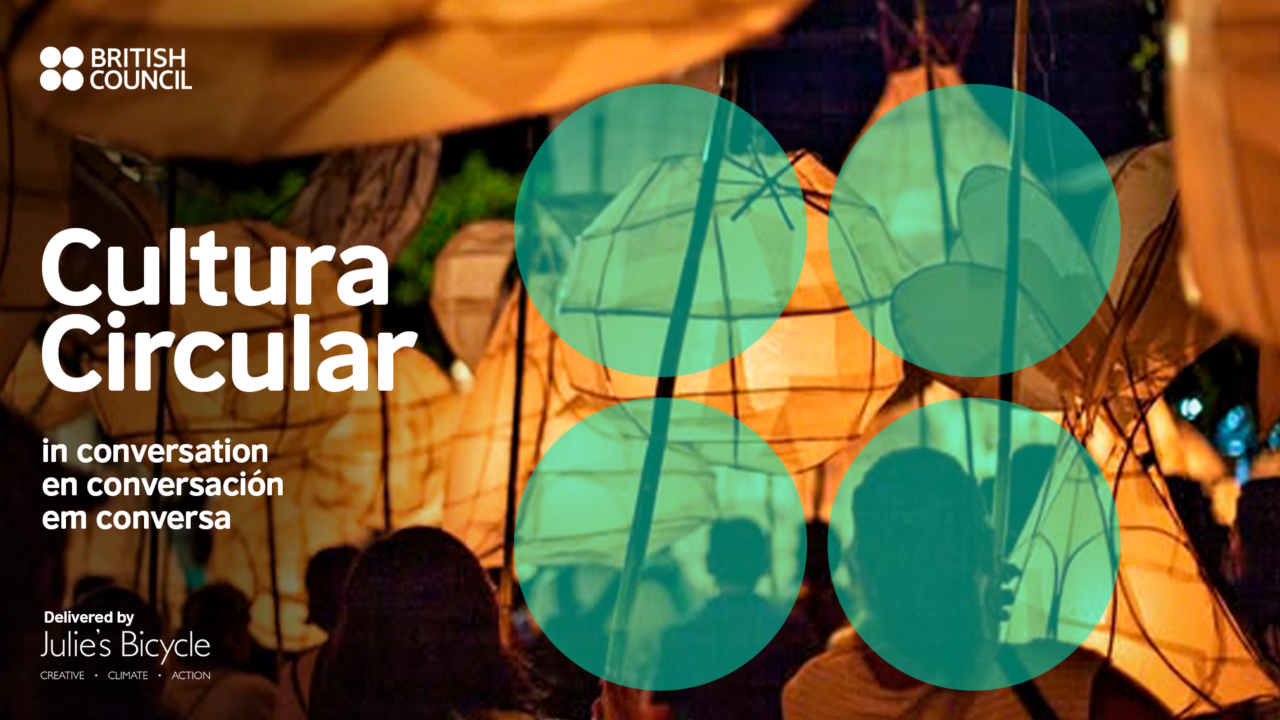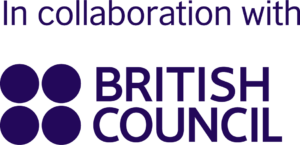- Posted on April 15th, 2025
Cultura Circular in Conversation

Cultura Circular in Conversation is a five part interview series celebrating environmental stewardship within arts and cultural festivals in Latin America, the Caribbean, and the United Kingdom. We’ll hear from several inspiring voices from the Cultura Circular programme, a network of practitioners committed to exploring creative, sustainable practices in festival production.
Our guests explore many topics related to culture and climate – from the regeneration of public spaces to the significance of community connection and Indigenous knowledge, sharing valuable insights into the challenges and benefits of creating and experiencing culture with environmental responsibility at its core.
Cultura Circular is a programme delivered by Julie’s Bicycle and supported by British Council Americas. It includes over 100 festivals from 11 countries, eager to share knowledge across borders to drive real change throughout the arts and culture sector. Over three cohorts, JB’s team has curated an engaging programme of training sessions to explore sustainability and ecology whilst encouraging the collaboration of like-minded people to accelerate their climate action. Cultura Circular in Conversation is published during the third edition of the Cultura Circular programme.
Each episode will be in either English, Spanish, or Portuguese, with transcripts provided in all three languages.
Find out more about the programmeLinks to episodes, bios and transcripts
Each episode will be in either English, Spanish, or Portuguese, with transcripts provided in all three languages
-
How can the transformation of public space through art create meaningful social change?
Featuring Cultura Circular alumni Laura Varon from Festival IBANASCA, Women’s Urban Art Festival (Colombia) and Patricia Contreras and Bárbara Martinez from Luciernagas para la Paz (Mexico), discussions centre on the festivals’ shared commitments to community engagement, gender equality and creating environmental awareness through public art. Guests reflect upon their festivals’ programmes of creative activities – ranging from lantern parades to recycling workshops, collective mural painting, and river clean-ups – and explore how to reclaim public spaces to embed sustainability and community at the heart of their work.
Guest Speakers
Laura Varón, IBANASCA Women’s Urban Art Festival, Colombia. A transdisciplinary platform for empowering and promoting the work of local, national, and international women artists, with a special focus on decentralising the “official” art spaces. It embraces decolonial perspectives that advocate for memory practices, the recognition of popular cultures, ancestral knowledge in communities, cultural geography, and the identity of territories.
Bárbara Martínez Moreno and Patricia Contreras, Luciérnagas para la Paz Festival 2025, Cuautla, Morelos, Mexico. A festival that reclaims public space at night through engaging its community in artistic creations. Running from March 5 to April 5, it features workshops for lantern making, an artistic experimentation lab, a discussion on cultural management, and the Grand Nocturnal March. This edition is strengthened by the participation of the UK-based organisation B-Arts.
Download the transcripts in English, Spanish and Portugese.
Note – audio in Spanish with English subtitles.
-
How can we transform our relationship with cities through culture, and place sustainability at the heart of festival practice?
In this episode, LuisRa Bergolla, ITINERANDO and Juan Murua Palacio, Córdoba Music Biennial, share their experiences of engaging with one another and public space at their events. The Córdoba Music Biennial in Argentina has developed innovative approaches through participatory design, circularity, and music. Itinerando, in Caracas, Venezuela emphasises sustainable mobility and its connection to heritage and accessibility, creating new ways to navigate the city. Together they explore how the Cultura Circular Programme has facilitated significant shifts in sustainability in their organisations from design and planning stages to execution and public engagement.
Guest Speakers
LuisRa Bergolla, ITINERANDO, the Sustainable Urban Tours Festival, is a platform driven by Collectivox to transform the way Caracas residents move around to explore and enjoy their city’s heritage. With a remarkable team of expert guides, the festival offers urban itineraries and experiences designed to reconnect with local heritage and identity while promoting sustainable mobility. Activities include walking tours, cycling routes, electric scooter rides, metro journeys, and guided shared transportation.
Juan Murua Palacio, Córdoba Music Biennial is an unprecedented space in the country’s music scene. Its stage extends across much of the city and its various spaces, engaging in a fluid exchange of meanings and experiences. It serves as a hub for thought and creative interconnection between industry professionals and citizens alike.
Download the transcripts in English, Spanish and Portugese.
Note – audio in Spanish with English subtitles.
-
Traditional knowledge and culture has a deep understanding of the crucial connection between community and the preservation of our environment.
Marvin George from Groundwork (Jamaica) discusses how the festival’s masterclasses connect academia and traditional knowledge holders, and Keron Niles from Welcome to Freetown (Trinidad and Tobago) talks about the importance of making traditional knowledge accessible and fun at their family-friendly Carnival event.
Guest speakers
Dr Keron Niles, Welcome to Freetown is Freetown Collective’s annual Carnival festival. Over the years, its safe, communal atmosphere has been loved by patrons. The event offers a unique interpretation of Carnival while staying true to indigenous traditions. With a core audience aged 25-44 who are socially and environmentally conscious, the festival is a space for like-minded individuals. Designed as a family-friendly event, it ensures enjoyment for all ages.
Marvin George, GROUNDWORK festival, (Jamaica). A festival run by Edna Manley College of the Visual and Performing Arts’ School of Drama that took place in March 2025. It consists of masterclasses in traditional Caribbean cultural forms including Kumina, an expressive artform celebrating life, death, and spirituality through dance, music, and the Kikongo language; Anansi Storytelling; and Jonkunnu, one of the oldest dance forms in Jamaica.
https://youtu.be/jUx4uxJrkMs
Download the transcripts in English, Spanish and Portugese.
Note – audio in English with English subtitles.
-
What challenges do we face when attempting to fix everything at once?
In this episode, Reneé Chalu from The Se Rasgum Festival and Gabriel Cevallos from Kino Beat, both based in Brazil, unpack the importance of sustainable goal setting for long-term structural change. They share insights on the value of peer sharing with creative networks that face similar economic, social and environmental challenges in the Global South, whilst highlighting the importance of localised efforts to drive positive change.
Guest speakers
Reneé Chalu, The Se Rasgum Festival is a vibrant multicultural platform held annually on the banks of the Guamá River in Belém, in the heart of the Amazon. It showcases the richness of Amazonian and Brazilian music, uniting legendary artists with emerging talents from Pará and beyond. With performances spanning genres from tecnobrega, samba, and carimbó to indie, psychedelia, and funk, the festival fosters bold, unexpected collaborations. It has made multiple environmental improvements including achieving zero waste certification.
Gabriel Cevallos, Kino Beat is a multilingual art festival. With experimental curatorial projects, it presents exhibitions, performances, shows and educational activities, promoting dialogues between art, technologies, ecology and society.
Download the transcripts in English, Spanish and Portugese.
Note – audio in Portugese with English subtitles.
-
How can festivals innovate to address the climate crisis while also fostering social impact?
Oliver Knust Restucci from Fluvial Valdivia festival in Chile and Beatriz Cisneros Contreras from Mi Primer Festival in Peru discuss how their festivals respond to the social, environmental, and economic challenges their audiences face with host Paola Moreira. By sustaining innovation (such as the music train through Patagonia and the solar van to power mobile cinema) and highlighting local and indigenous musicians, these festivals examine environmental themes while engaging those who are often excluded.
Guest speakers
Oliver Knust, Fluvial is a festival in Valdivia that promotes the development of the Chilean music industry. Through environmental and heritage education activities, it aims to raise awareness and encourage action on the climate emergency caused by the music industry.
Beatriz Cisneros, My First Festival (MPF) is an international film festival in Lima, Peru, that nurtures a love for cinema among children and youth. It incorporates an innovative solar energy program that emphasises accessibility in communities.
Download the transcripts in English, Spanish and Portugese.
Note – audio in Spanish with English subtitles.
-
How can we work with our communities in a flexible way, to translate conceptual discussions into practical action?
In this episode host Paola Moreira speaks with Yociel Marrero Báez from Festival Internacional de Medio Ambiente de Cine del Caribe (Isla Verde, Cuba), a film festival focused on insularity and environmental themes in the Caribbean, that aims to highlight solutions, over problems.
Yociel discusses their approach to working with communities, stressing the importance of understanding the unique characteristics of each place, and listening to the needs of the people – remaining flexible, adapting methods and involving them in the design of the festival’s activities.
Guest speaker
Yociel Marrero Báez is an Environmental Engineer, Director of the Economics and Responsible Consumption Programme of the Fundação Antonio Núñez Jiménez de la Naturaleza y el Hombre. He is focussed on implementing the concepts of socially and environmentally responsive business management on projects in Cuba.
Download the transcripts in English, Spanish and Portugese.
Note – audio in Spanish with English subtitles.
Hosts
Spanish episodes:
Paola Moreira is the CEO and founder of Pragmatic Pod Limited, specialising in podcast production that combines storytelling, technology, and creativity. With over a decade of experience and two Latin Podcast Awards for her intercultural podcast Perfiles e Influencias, Paola is committed to the dissemination of cultural and social topics and explores the relationship between culture and creativity, giving voice to impactful initiatives.
Portugese episode:
Juli Baldi is a music researcher, journalist, and creative director at Bananas Music, a music curation company for brands. She is also the founder of Mapa dos Festivais, a platform dedicated to mapping and analyzing music festivals in Brazil. At Mapa, she created a special editorial section to discuss the intersection of festivals and climate issues and curated and moderated panels on the topic at the latest edition of SIM São Paulo.
English episode:
Tenaya King is a Climate Change and Sustainability Specialist at Julie’s Bicycle, with experience in environmental sustainability, public policy and climate resilience. She’s passionate about creating change through cultural events, building resilience through the arts, and using connection and community to address the climate crisis.

